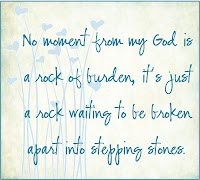
Thursday's Therapy
13 Ways to Help Yourself Through the Hard Times
Tonight, I am in Georgia, taking some time to go through my parents things since their deaths (Daddy in January, 2004, and Mother in December, 2010). I picked up an old Reader's Digest in their basement, and my eyes were drawn to an article written in February, 1997 called, "How to Help Yourself Through the Hard Times" by Collin Perry. (In February, 1997, my Merry Katherine would have been about to turn ten years old!) It was interesting to me to see how things have not really changed that much in terms of the suggestions the experts were making about what helps a person to cope in hard times like in our child-loss grief:
- Let Yourself Grieve. Psychologist and bereavement specialist Patrick Del Zoppo says, "It's your 'desert experience' --a time of feeling barren of options, even hope. The important thing is not to allow yourself to be stranded in the desert." At first when we hear such bad news as our child has been killed, he says, "(Numbness) is a first-line defense that shields the consciousness from some extremely unpleasant reality." But he encourages us to allow the emotions to flow after the reality has hit home: "Tears aren't a sign that you're simply feeling sorry for yourself but are an expression of sadness or emotion that must find an outlet." One child-loss mother was so stunned she didn't cry for weeks; then she "locked (herself) in (her) room and just wailed.... It was as though this great weight was being lifted from my shoulders."
- Understand Your Anger. "Anger is natural, but it can be released in a wholesome way." says Del Zoppo. Properly understood, it can even serve your recovery. Anger at times can be crippling, but then it can also spark you to get through your harrowing experience.
- Face the Challenge. Another obstacle on the rod to health after a significant loss can be denial. Instead of facing what has happened to them, many people try to fill up that empty feeling looking for an escape (like drinking, eating, or literally running away) until they finally realize they cannot run away from their troubles, and begin to face the challenge.
- Get Out and Do! Bessel A. van der Kolk, psychiatrist says, "After a few weeks, I urge people recovering from loss to get back into a routine. It's important to force yourself to concentrate on things other than (just) your hurt." He suggests we consider the following activities to help us through this grief process:
- Join a support group. You'll need someone to talk to--and the most effective kind of conversation can be with someone else who has undergone an ordeal.
- Read. When you can focus after the initial shock, reading--especially self-help books-- can offer inspiration as well as relaxation.
- Keep a journal. Many find comfort in creating an ongoing record of their experiences. At best it can serve as a kind of self-therapy.
- Plan events. The idea that there are things to look forward to reinforces that you are forging ahead into a fresh future. Schedule that trip you've been postponing.
- Learn new skills. Take a course at a community college, or take up a new hobby or sport. You have a new life ahead; any new skill will complement it.
- Reward yourself. During highly stressful times, even the simplest daily chores--getting up, showering, fixing something to eat--can seem daunting. Consider every accomplishment, no matter how small, a victory to be rewarded.
- Exercise. Physical activity can be especially therapeutic. "Exercise gets you out of your head and your troubles, and it allows you to experience yur body with your two feet on the ground."
- Get outside yourself. "Many people who survive traumatic situations eventually find the need to take meaningful action. They may start organizations, write books, work for awareness. Along the way they discover that a powerful way to help ourselves lies in helping others. As one cancer victim conceded, "The truth is that thinking of others rather than spending a lot of time thinking about myself played a huge role in my full recovery."
- Be patient with yourself. People often ask, "When will this terrible pain stop?" Experts resist being pinned down to time frames. A lot depends on disposition, the support within your environment, and if you get help and work on it." So, be easy on yourself. Recognize that you'll need time, and that your own pace of recovery may not fit with that of others. Congratulate yourself at each step through grief: I'm still here, I've made it this far!"











































No comments:
Post a Comment